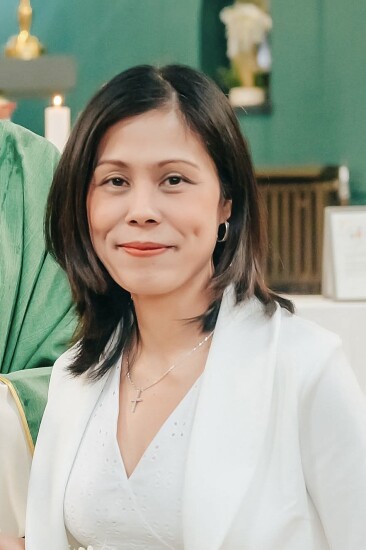31st July 2025 by Claire O'Donnell

Sandra, 51, is married with one daughter. She is originally from the Philippines and now lives in Glasgow.
Can you tell us about your experience with secondary breast cancer?
I was primarily diagnosed with breast cancer in July of 2022. Mastectomy and reconstruction was done a few months after and treatment. However, in July of 2023, there was a reoccurrence which led to another surgery and treatment. I’ve complained about some pain in my lower right abdomen and was told this was due to the surgery but
to be sure, I was recommended for a scan. Feb 2024 there were lesion found in my liver and skull as a result of the CT scan. The news was delivered to me and my husband by my breast cancer surgeon. I have been living with secondary breast cancer in my liver and skull with the subtype of ER,PR and HER2 positive for over a year now. During which, I had undergone changes in the treatment since the lesion in the liver has progressed. It is quite an emotional challenge having to deal with an aggressive cancer. In the span of only three years, not only has the cancer metastasised, it has also tripled in size in my liver.
My experience with the medical team is good. Receiving devastating news about cancer can be life changing. It takes time to digest the news and to go about the rest of your life with it. Now I have a certain degree of acceptance and take comfort that although it’s not curable, there is treatment and could help improve the quality of my remaining life.
What do you think are the main challenges for ethnic minorities diagnosed with breast cancer or secondary breast cancer?
I think the main challenges for ethnic minorities is not knowing their way around the NHS and what it provides. Being a minority, unless socially confident, there are a number of factors that make it a challenge to get information. Factors like language barriers first and foremost, getting basic help could become a burden to ethnic minorities. The simple task of communicating all you have in mind can become a daunting task to the patient. Communication is essential to be able to express one’s thoughts and feelings on the service provided and also sharing of an experience to fellow patients and the service provider.
Have you felt like your identity - your race, culture or faith - impacted the care you received?
In my experience, as an Asian patient, I try my very best to overcome being an introvert and get as much information and getting a service that is at the very least, satisfactory to my needs. To be fair, I have not felt that being of Asian descent has negatively impacted the care I received. It has always been my belief that if you treat other people with respect then you’ll get a good level of sympathy.
What would you like to see more of in your community when it comes to cancer awareness?
I would like to see more advancement in treatment of cancer. I find it very informative although there’s information beyond my understanding, it is good to be aware of new developments in technology and medicine.
How have you been supported by Make 2nds Count and why are charities like this so important?
Make 2nds Count has become a community that I can rely on not just in terms of having someone to talk to regarding my case. I’m able to get valuable information on advice, the type of treatment everyone else is going through and sharing of experiences and other information that I could not have acquired on my own.
What changes do you hope to see in how ethnic minority communities and cancer charities such as M2C work together in the future? How can we facilitate this?
I think welcoming more ethnic minority communities into support groups such as M2C can be the next step into a more engaging relationship. Being able to reach out and putting effort in understanding each other can develop into a healthy relationship and will also lead to the ethnic minority opening up and feel comfortable in expressing their thoughts and feelings. It is also a good opportunity for the support group to understand more about the difficulties the ethnic minority are going through and eventually find a solution.